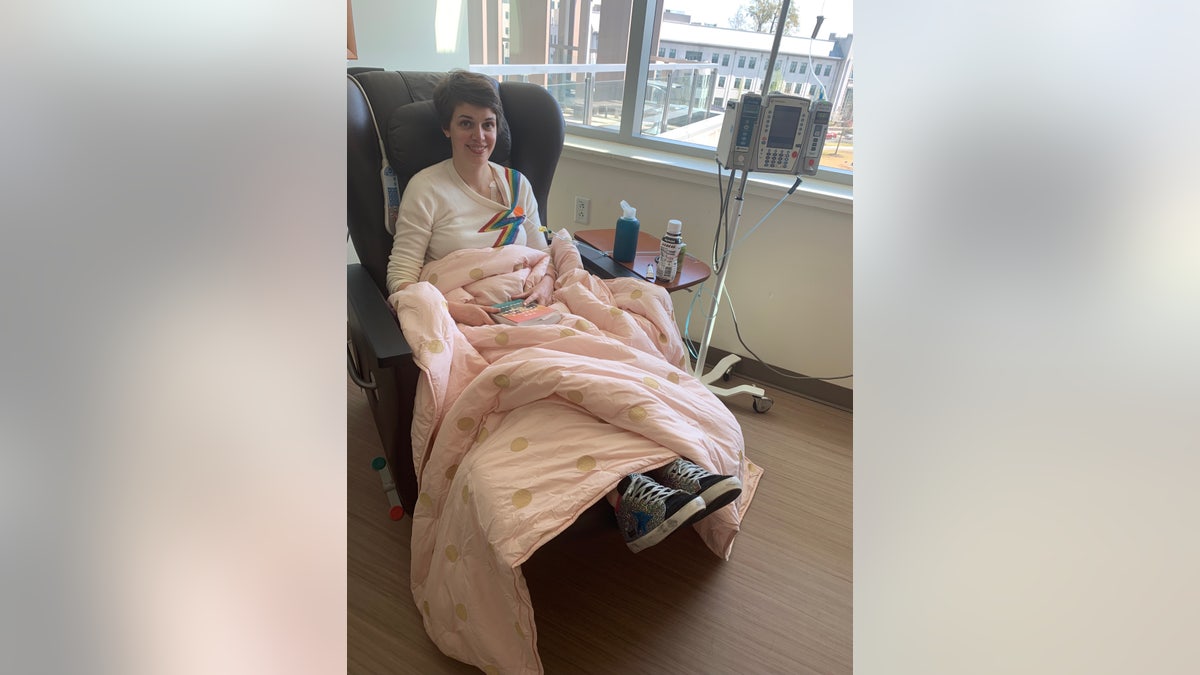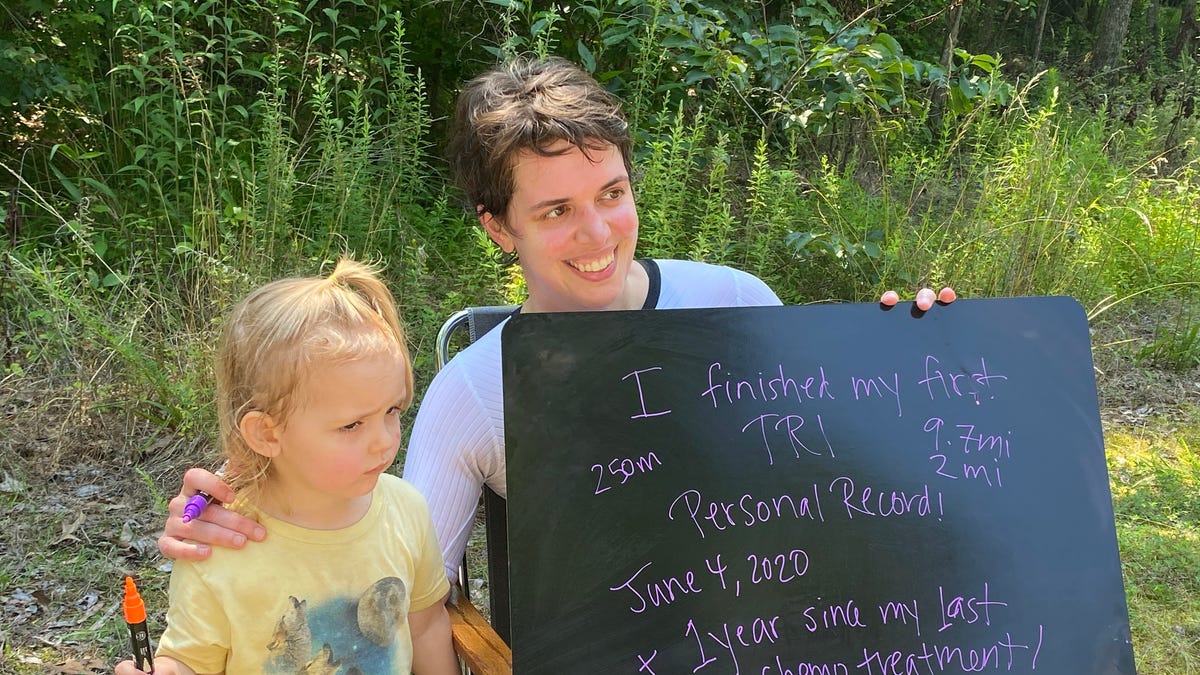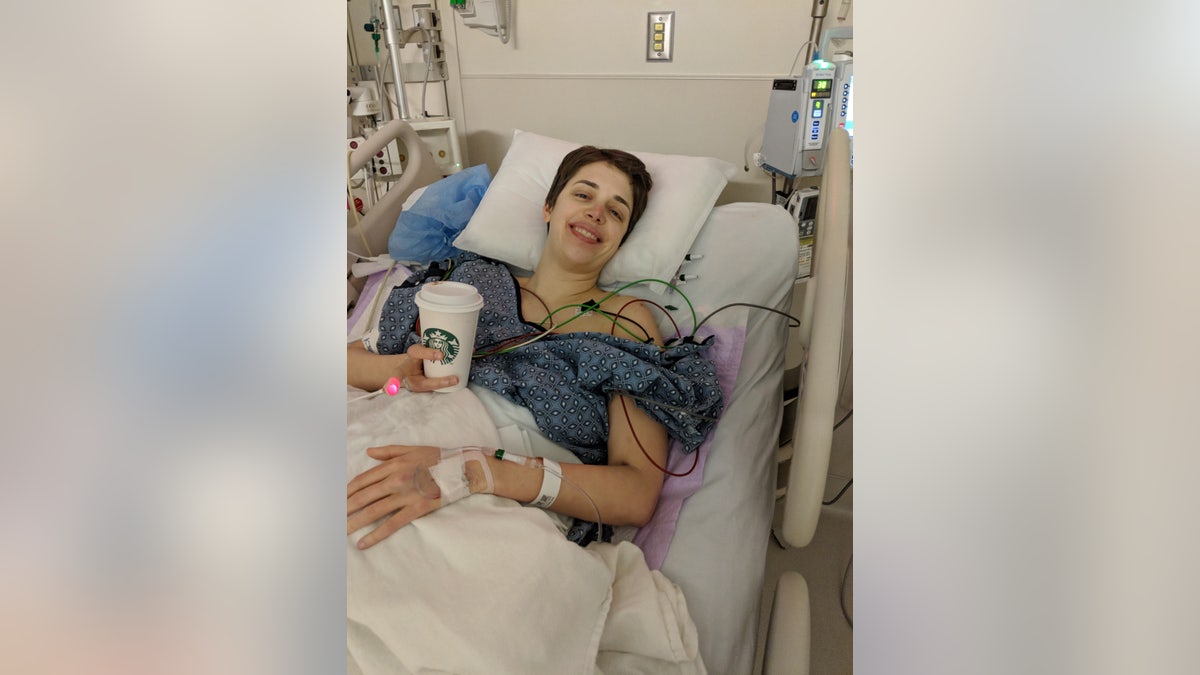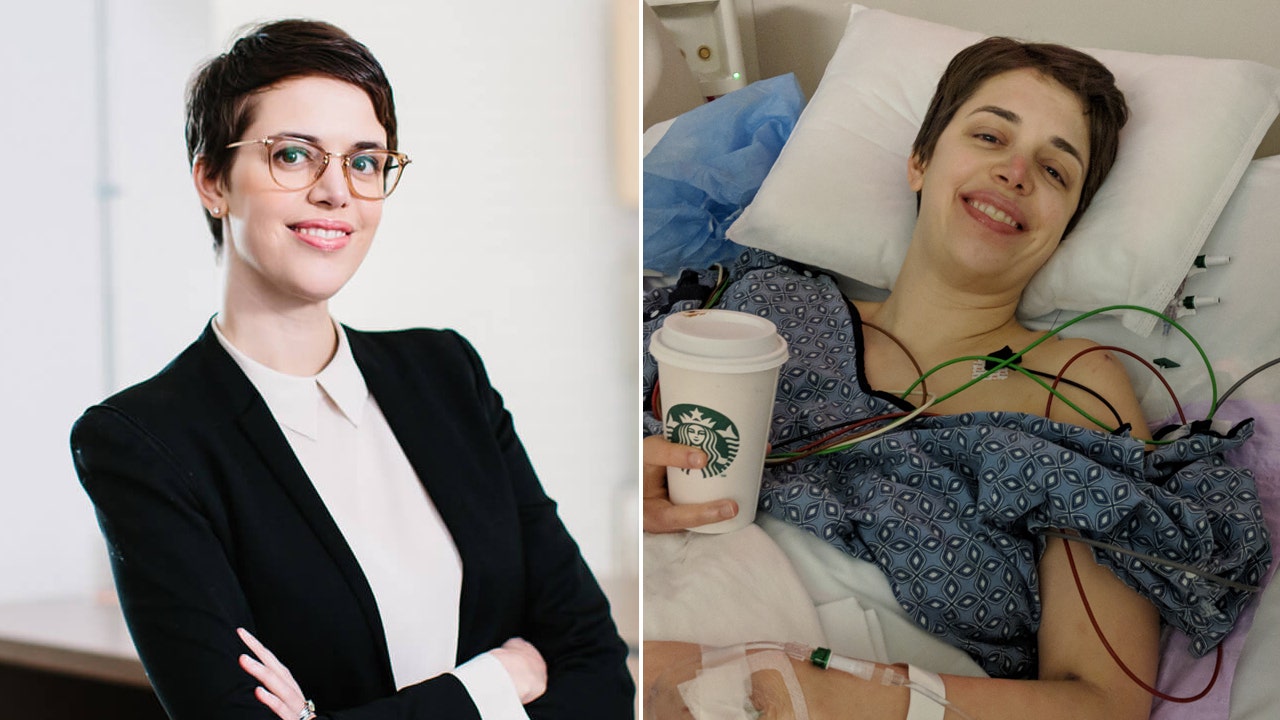When Brooks Bell was 38, doctors told her she was too young to have colon cancer, dismissing her textbook symptoms as “likely hemorrhoids.”
A few months later, after pushing for tests, the North Carolina-based entrepreneur was diagnosed with Stage III colon cancer.
Bell, now 43, is encouraging other younger adults to listen to their bodies and advocate for their health, particularly as colon cancer cases are rising among people under 50.
COLORECTAL CANCER IS NOW LEADING CAUSE OF DEATH AMONG YOUNG ADULTS WITH CANCER: NEW REPORT
The founder of a digital analytics company, Bell was traveling for a technology conference five years ago when she found blood in her stool.
“I called a doctor from my hotel room and explained what was going on, and she said that blood in the stool is very common,” Bell told Fox News Digital. “She said it was almost definitely a hemorrhoid and that I should just watch it, and that it would likely go away in a couple of days.”
Brooks Bell of North Carolina is pictured after chemotherapy at right. After her treatment and recovery, she was voted onto the Board of Directors of the Colorectal Cancer Alliance. (Brooks Bell)
It didn’t go away, and a few weeks later, Bell made an appointment with a different doctor.
“She checked me out and didn’t find a hemorrhoid, but said that was probably still what it was because of my young age,” she said.
CANCER IS NOW LEADING CAUSE OF DEATH AMONG HIV-POSITIVE PEOPLE, REPORT SAYS: ‘OF GREAT CONCERN’
Bell was hoping the doctor would refer her to a gastroenterologist for a colonoscopy, but she didn’t.
“At that point, I didn’t really trust where this was going, because it was still bleeding after two months,” she said. “And so I called a gastroenterologist myself.”
Four days later, during the colonoscopy, the doctors found a tumor in Bell’s colon that was causing the bleeding.
“They told me they’d be in touch, but that it was almost certainly cancerous.”

Bell is pictured during a chemotherapy treatment. She received three months of intense chemo following her surgery. (Brooks Bell)
Bell’s cancer was Stage III, which she said was actually good news.
“It was still a small tumor and I had about an 87% chance of survival,” she said.
Bell immediately had surgery to remove 10 inches of her colon. Following that was three months of high-dose chemotherapy that was 50% more intense than most regimens.
CANCER RISK COULD INCREASE WITH CONSUMPTION OF CERTAIN FOODS AND DRINKS, STUDY FINDS
After treatment, there was the waiting game to make sure the disease didn’t recur.
“The first year was terrifying — I had lots of nightmares,” Bell shared. “Colon cancer has the highest rate of coming back in the first year, and then it drops off after that.”
Today, five years later, Bell is cancer-free.
Understanding risk factors
Dr. Austin Chiang, gastroenterologist and chief medical officer of Endoscopy at Medtronic, a medical equipment manufacturer in Philadelphia, Pennsylvania, said it’s hard to pinpoint the exact cause of rising colon cancer rates in young people, but he has noticed a few contributing factors.
“Related to diet, there’s been an increase in consumption of red meat and ultra-processed foods,” he told Fox News Digital.

Brooks Bell speaks with guests at the first-ever Colonoscopy Gala at the Contemporary Art Museum in downtown Raleigh, North Carolina, on Feb. 28, 2020. (Eamon Queeney for the Colonoscopy Gala)
“We’ve also seen an association with rising rates of obesity. The trouble is, even if this trend is related to either of those things, what we don’t yet understand is the mechanism behind it.”
To reduce risk, Chiang said his team often recommends limiting the consumption of red meat and alcohol, as well as not smoking, which is known as a big risk factor for cancer.
“Remaining physically active is also a good rule of thumb, but beyond that, there are no other known means to reliably reduce cancer risk,” he added.
TO REDUCE CANCER RISK, SKIP THE ALCOHOL, REPORT SUGGESTS: ‘NO SAFE AMOUNT’
After hearing that exercise reduces the risk of cancer coming back, Bell committed to working out every day.
“I decided I was going to exercise harder than I ever exercised in my life,” she said. “The day I finished my treatment, I was out with my running shoes.”
She even decided to train for a triathlon — finishing the event exactly one year after finishing her cancer treatment.

Brooks Bell is pictured after completing her first triathlon, one year after her final chemotherapy treatment. (Brooks Bell)
Nutrition has also been a bigger focus for Bell since her cancer treatment — particularly since colon cancer is so closely linked to gut health.
“I eat as many vegetables as I can, and I really focus on my fiber intake,” she said. “A plant-based diet helps with your microbiome health, so that’s my main focus.”
In 2024, an estimated 106,590 new cases of colon cancer and 46,220 new cases of rectal cancer will be diagnosed in the U.S.
Bell occasionally eats dairy and some lean meats, but avoids red meat.
She also sees a functional doctor — a physician that focuses on identifying and eliminating the issues that cause disease as opposed to treating and reacting to symptoms — who helps ensure that she gets the right amount of supplements and antioxidants.
Colon cancer screening guidelines
Since 2021, the U.S. Preventive Services Task Force (USPSTF) has recommended that adults ages 45 to 75 get screened for colorectal cancer.
Prior to 2021, the guidance was to get screened starting at 50.
THESE 8 HEALTH SCREENINGS SHOULD BE ON YOUR CALENDAR FOR 2024, ACCORDING TO DOCTORS
“That change was a huge win,” said Bell. “I think we should be grateful for that — they don’t move guidelines very often. There was overwhelming evidence to get it to 45.”
There are some indications that screening should start at 40, Bell said — “so that would be the next goal.”

Dr. Austin Chiang, gastroenterologist and chief medical officer of Endoscopy at Medtronic, a medical equipment manufacturer in Philadelphia, said it’s hard to pinpoint the exact cause of rising colon cancer rates in young people. (Dr. Austin Chiang)
“The reason it’s not at 40 is the cost and limited availability of colonoscopies — it would put more strain on the system,” she said.
Beyond the rectal bleeding that Bell experienced, other colon cancer symptoms include changes in bowel habits, abdominal discomfort, weakness or fatigue, a feeling of the bowel not completely emptying, and unexplained weight loss, according to Mayo Clinic.
Barriers to care
One of the main barriers in terms of young people getting early screening and care is lack of awareness of the risk, Bell said.
“It wasn’t that my doctors were bad — it’s just that they didn’t know this was a risk,” she told Fox News Digital. “They just don’t think they’re staring down a cancer diagnosis when someone is so young.”
There is a tendency to associate colorectal cancer with older age.
“For primary care doctors, I think they’re supposed to kind of rule out everything else before sending you in for a big-ticket item like a colonoscopy.”
Chiang agreed that there is a tendency to associate colorectal cancer with older age.
“Because current screening guidelines recommend colonoscopies starting at age 45 for people of average risk, we’re less accustomed to seeing younger patients showing symptoms of colon cancer,” he told Fox News Digital.

Brooks Bell (far right, back) moderates a discussion at the White House as part of its Cancer Moonshot initiative. (Brooks Bell)
“What makes it even more difficult is that patients with early-onset cases often experience different symptoms, so there’s still learning to be done as we become more aware and cognizant of the risk.”
Many people don’t know they need to be screened starting at age 45, Chiang pointed out — “which is why it’s important to have a primary care doctor who can help keep track of that for you.”
There’s also a common misconception that colonoscopies are dangerous or uncomfortable, he added, which may create some fear.
MISSING MAMMOGRAMS: OVER 20% OF WOMEN DON’T FOLLOW BREAST CANCER SCREENING GUIDELINES, STUDY SAYS
“Finally, there are social determinants that create barriers as well, like physical proximity to health care centers or inability to take a day off from work to be screened,” the doctor said.
There’s a common misconception that non-invasive, stool-based tests are equivalent to getting a colonoscopy, Chiang warned, but there are some limitations associated with that method.
“If you have a positive stool test, you aren’t able to locate where that result is coming from, and more importantly, you’re not able to remove it on the spot,” he said. “With a colonoscopy, doctors can do both of those things.”

Other than skin cancers, colorectal cancer is the third most commonly diagnosed cancer in the country. (iStock)
Colonoscopies also allow doctors to detect lesions early before they turn into cancer — “especially with the help of AI technology, like our GI Genius tool,” Chiang noted.
“Our hope is that tech like this will help to standardize patient care, so that everyone who comes in for a colonoscopy has the best detection rate possible.”
Committed to the cause
After her diagnosis, Bell immersed herself in studying as much as she could about the disease.
“It was alarming to learn how preventable it is, and how underfunded it is, and how it’s rising in young people, and the importance of colonoscopies,” she said.
CLICK HERE TO SIGN UP FOR OUR HEALTH NEWSLETTER
Intent on raising awareness, Bell joined the Board of the Colorectal Cancer Alliance, a nonprofit focused on colon cancer prevention.
In 2022, Bell founded the nonprofit Lead From Behind as a subsidiary of the Colorectal Cancer Alliance.
“The goal was to create a fresh brand focused on staying healthy and positioning colon cancer as the preventable cancer — and to help destigmatize colonoscopies.”

Brooks Bell is pictured after undergoing surgery to remove a section of her colon after her cancer diagnosis. (Brooks Bell)
Lead From Behind has drawn a handful of prominent voices to the cause, including pro football player Dak Prescott and actor Ryan Reynolds.
Bell has also spoken at the White House as part of its Cancer Moonshot initiative, which aims to reduce cancer deaths by 50% over the next five years.
She is also hard at work on a new initiative focused on raising funds for colonoscopies for underinsured individuals.
CLICK HERE TO GET THE FOX NEWS APP
“I want to try to continue to shift our culture to make colonoscopies and colon cancer prevention part of our conversations about wellness — so it’s just something that healthy, smart people do automatically as as they get into their 40s,” she said.
In 2024, an estimated 106,590 new cases of colon cancer and 46,220 new cases of rectal cancer will be diagnosed in the U.S., according to the American Cancer Society (ACS).
Other than skin cancers, colorectal cancer is the third most commonly diagnosed cancer in the country.





